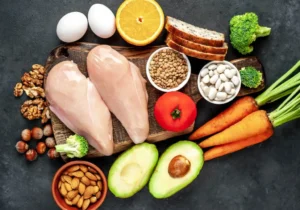Table of Contents
Introduction
Maintaining high energy levels is essential for a productive and fulfilling life. While quick fixes like caffeine and energy drinks are popular, they often lead to crashes and long-term health issues. Instead, focusing on natural sources of energy, such as vitamins and minerals, can provide sustained vitality without the side effects. This article explores 30 top vitamins and minerals that boost energy, their benefits, and how to incorporate them into your daily diet.

30 Top Vitamins and Minerals for Natural Energy Boost
Why Vitamins and Minerals Matter for Energy
Vitamins and minerals play a vital role in converting food into energy. They support metabolic processes, enhance oxygen transport, and improve cellular function. By understanding their roles, you can make informed choices to optimize your energy levels naturally.
30 Top Vitamins and Minerals for Energy
1. Vitamin B12
Vitamin B12 is essential for red blood cell formation and nerve function. It helps convert food into glucose, the body’s primary energy source. Foods rich in B12 include grass-fed beef, wild salmon, eggs, and dairy products.
2. Vitamin B6
Vitamin B6 aids in the metabolism of carbohydrates, proteins, and fats. It also supports neurotransmitter production, which regulates mood and energy. Top sources include turkey, chicken, tuna, and sunflower seeds.
3. Vitamin C
Vitamin C enhances iron absorption, which is crucial for oxygen transport. It also supports the immune system and reduces fatigue. Citrus fruits, strawberries, and bell peppers are excellent sources.
4. Iron
Iron is a key component of hemoglobin, which carries oxygen to cells. Iron deficiency can lead to fatigue and low energy. Include iron-rich foods like spinach, lentils, and pumpkin seeds in your diet.
5. Magnesium
Magnesium is involved in over 300 biochemical reactions, including energy production. Foods like spinach, nuts, and dark chocolate are rich in magnesium.
6. Coenzyme Q10 (CoQ10)
CoQ10 is vital for ATP production, the energy currency of cells. It also acts as an antioxidant. Fatty fish, organ meats, and nuts are good sources.
7. Vitamin D
Vitamin D supports muscle function and reduces fatigue. Sunlight is the best source, but fatty fish and fortified dairy products can also help.
8. Thiamine (Vitamin B1)
Thiamine helps convert carbohydrates into energy. It is found in whole grains, beans, and nuts.
9. Riboflavin (Vitamin B2)
Riboflavin is involved in energy production and supports cellular function. Dairy products, eggs, and green leafy vegetables are rich in riboflavin.
10. Niacin (Vitamin B3)
Niacin aids in converting food into energy and supports digestive health. Chicken, turkey, and peanuts are excellent sources.
11. Pantothenic Acid (Vitamin B5)
Pantothenic acid is essential for synthesizing coenzyme A, which is involved in energy metabolism. Avocados, yogurt, and sweet potatoes are good sources.
12. Zinc
Zinc is crucial for energy metabolism and immune function. Foods like lamb, chickpeas, and pumpkin seeds are rich in zinc.
13. Protein
Protein provides amino acids that support muscle repair and sustained energy. Include poultry, fish, and legumes in your diet.
14. Creatine
Creatine enhances ATP production, improving physical performance and reducing fatigue. It is found in meat and fish.
15. Tyrosine
Tyrosine is a precursor to neurotransmitters that regulate mood and energy. Sources include dairy products, meats, and nuts.
16. Selenium
Selenium supports thyroid function and energy metabolism. Brazil nuts, seafood, and eggs are rich in selenium.
17. Ashwagandha
Ashwagandha is an adaptogen that helps the body manage stress, improving energy levels naturally.
18. Rhodiola Rosea
Rhodiola rosea is another adaptogen known for reducing fatigue and enhancing physical and mental performance.
19. Melatonin
Melatonin regulates sleep-wake cycles, ensuring better sleep quality and higher energy levels during the day.
20. Citrulline
Citrulline enhances blood flow and nutrient delivery to muscles, improving endurance and reducing fatigue.
21. Beetroot Powder
Beetroot powder is rich in nitrates, which improve blood flow and oxygen delivery to tissues.
22. L-Theanine
L-theanine promotes relaxation without drowsiness, often combined with caffeine to enhance focus and energy.
23. Mushrooms
Certain mushrooms, like cordyceps, enhance oxygen utilization and improve endurance and energy levels.
24. Collagen
Collagen supports joint and connective tissue health, improving physical performance and overall energy levels.
25. Probiotics
Probiotics improve gut health, enhancing nutrient absorption and supporting overall energy metabolism.
26. Green Powders
Green powders contain nutrient-dense vegetables and algae that provide vitamins, minerals, and antioxidants to support energy.
27. Elderberry
Elderberry is rich in antioxidants and vitamins that support overall health and energy levels.
28. Ginseng
Ginseng is an adaptogen that combats fatigue and boosts energy levels naturally.
29. Folate (Vitamin B9)
Folate is essential for DNA synthesis and repair, and it supports red blood cell formation. Leafy greens, beans, and citrus fruits are good sources.
30. Potassium
Potassium is crucial for muscle function and energy production. Bananas, sweet potatoes, and spinach are rich in potassium.
Natural Ways to Boost Energy
In addition to consuming energy-boosting nutrients, adopting healthy lifestyle habits can enhance your vitality:
- Stay Hydrated: Dehydration can cause fatigue. Drink plenty of water throughout the day.
- Exercise Regularly: Physical activity improves blood flow and energy levels.
- Prioritize Sleep: Aim for 7-9 hours of quality sleep each night.
- Manage Stress: Practice mindfulness, yoga, or deep breathing exercises.
- Eat a Balanced Diet: Focus on whole foods rich in vitamins and minerals.
Risks and Side Effects
While vitamins and minerals are generally safe, excessive intake can lead to side effects. For example, high doses of B vitamins may cause digestive issues, and too much iron can be toxic. Always consult a healthcare professional before starting any supplement regimen.
Conclusion
Incorporating energy-boosting vitamins and minerals into your diet is a natural and effective way to enhance vitality. By focusing on nutrient-rich foods and healthy lifestyle habits, you can maintain high energy levels and improve overall well-being. Remember, balance is key—consult a healthcare provider to tailor your diet and supplement intake to your specific needs.